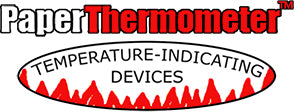A Note on Ambient Temperature and Surface Temperature
View/Download Printable PDF Version
- Temperature Label Use in Dish Sanitation
- Most Popular Temperature Labels for Dish Sanitation
- Product Instructions
- Free Food Service Thermolabel Sample
- Learn More About Temperature Labels
It is important to understand that Paper Thermometer™ irreversible registering temperature indicators measure surface temperature. Surface temperature does not necessarily equal ambient temperature. Ambient temperature is the temperature of the environment, most commonly the air temperature. Our temperature labels show the temperature that the item’s surface reaches. The temperature of the environment that the item is in impacts but is not equal to the item’s surface temperature.
Ambient Temp ≠ Surface Temp
Given a little thought, this relationship is easy to understand. If you were to place a tomato in the freezer would it instantly be frozen? Of course not. It takes time for the temperature of the object (surface temperature) to equalize to the temperature of the environment (ambient temperature). The temperature of the tomato will gradually lower until it is equal with the environment in the freezer.
The same principle applies to the temperature of a dish in a warewasher. That dish will take time to heat to the temperature of the water. In fact, a dishwasher’s cycle time is typically not long enough for the dishes to reach the rinse water temperature. It is not advisable to try to test for the rinse water temperature with a temperature label on a dish. When a 180°F (82°C) rinse temperature is used, the items will not actually reach 180°F (82°C). A 180°F (82°C) rinse is used when the desired surface temperature of the dishware is 160°F (71°C). This 160°F dish surface temperature is the FDA Food Code requirement, tested using a 160°F temperature label. Understanding the relationship between ambient temperature and surface temperature is important to the correct use of Paper Thermometer™ dishwasher temp labels.
